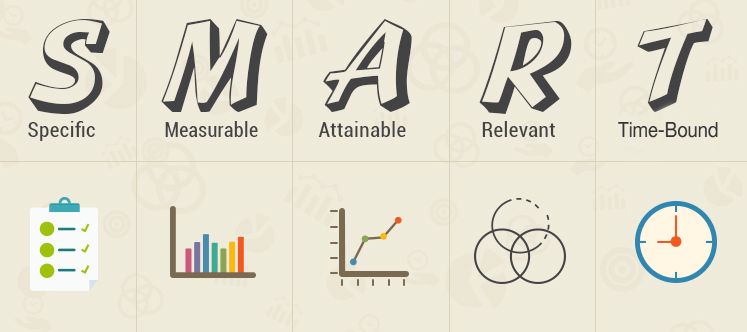Why Define SMART Goals and What Should They Be

One of the most essential parts of site-building is defining and knowing your website's SMART goals. This particular task precedes all the others from your site to-do list such as copy, colour schemes, plugins and even your domain name.
SMART stands for:
Specific, Measurable, Attainable, Relevant and Time-bound.
Great websites are more than just about its appearance, site architecture and social media integration; they’re ‘good’ because it has clearly defined goals. It knows that it cannot have that considerable edge against competition if it doesn’t have a logical road-map. More than just being aesthetically pleasing, it has to be well thought out, has useful content and is audience-targeted.
Needless to say, one cannot undermine the significance of having clearly defined website goals for your website branding and placement in the business community.
Importance Of SMART Goals
Website goals will be your basis for the hard and crucial parts of your website. These goals can help you create tangible and measurable metric which then will be analysed in order to give you exact numbers – numbers that show whether you’re getting the results you want or not, and numbers that point you how to improve different aspects of your website for increased web traffic, engagement and conversion.
Where To Use Website Goals
- Website Organisation – clearly defined goals guide you to prioritize structure, design and content and effectively organise each aspect of your site in order to allow the best user experience which can boost website traffic, sales lead quality and higher conversion rates.
- High Quality Content – clearly defined goals guide you to creating content that are relevant, useful and updated.
- Audience Targeting – clearly defined goals guide you to the type of users and consumers you want as your clients and in building a website that give answers to their questions, meet their expectations and provide solutions to their problems.
- Social Media Integration – clearly defined goals guide you which social platforms to take advantage of in order to promote your business presence on them, because social media is a critical marketing strategy for reaching your audience base and even those not in your expected demographics.
- Success Measurement – clearly defined goals guide you to understanding whether your website is effective or not, and if the goals you’ve set have been met, not been reached, or have been surpassed.
Difference Between Website Goals And Objectives
Definition
Goals are general concepts and statements about the whys and hows of your business– what you intend to accomplish. They compose of broad business ideas and outcomes that serve as framework or backbone for determining the more specific ideas and outcomes of the website, or your business.
Objectives are the tangible and concrete concepts and statements that are specific, measurable, achievable, realistic and can be achieved within an expected time-frame. These are milestones reached in order to achieve the goal.
Simply put, your website goal is the destination while your website objective is the measure of progress to reach the destination.
Measurement
Goals are not measurable; objectives are. You can create a concrete set of performance metrics for measuring whether the objectives have been reached or not so even if you cannot quantify goals, you can use your statistics for your website objectives as basis or proof of the success of your website goals.
Timeframe
Goals are set on a longer timeframe and therefore, can be used as an on-going motivation and inspiration for website planning success. Objectives, by contrast, are time-bound in expected schedules you have set in order to measure progress. Reaching an objective milestone allows you to tweak, change and improve the course your business is going to in an effort to achieve all objectives and eventually, your business goals.
Tracking Your Website KPIs
The concrete set of performance metrics you should use to measure your objectives are called key performance indicators (KPIs). Your KPIs are the critical success factors and performance drivers to keep your website and your business on track. Creating a digital marketing strategy allows you to clearly outline your goals and success factors.
Creating Effective Website Goals
Different sites have different goals. Your main job is to identify what you want to accomplish and then create a plan on how to achieve it. Knowing what your website goals are will give you a clear vision of your website objectives. That being said, you should use the SMART model for making your objectives.
Goal | Objective |
|---|---|
Delivery of product or service | Launching a new product in the next 6 months to generate 10% sales. |
Lead generation and sales conversion | Increasing web visitors by 25% in the next 12 months. |
Brand communication and positioning | Positioning the business as the dominating force for provision of a specific product by taking advantage of different social media platforms, resulting to a 200% increase in the next 18 months. |
